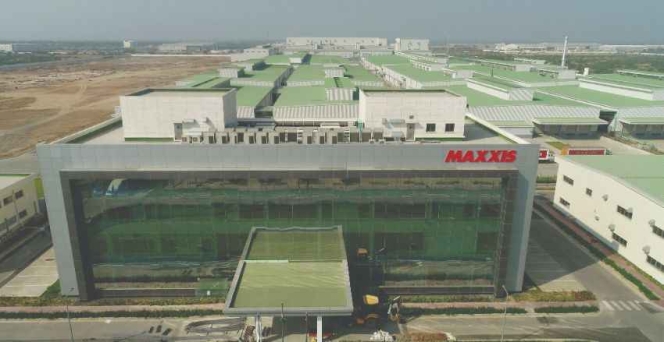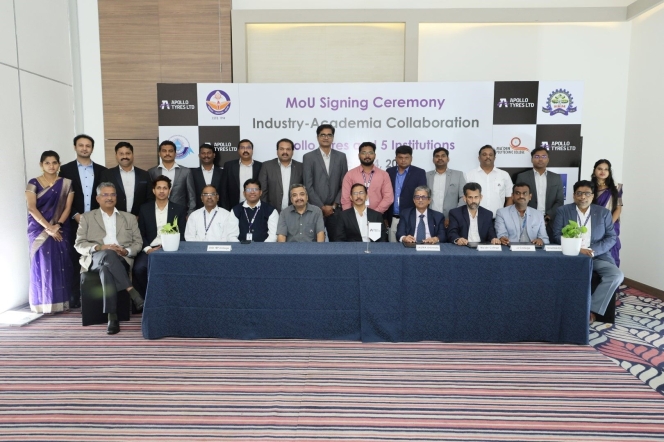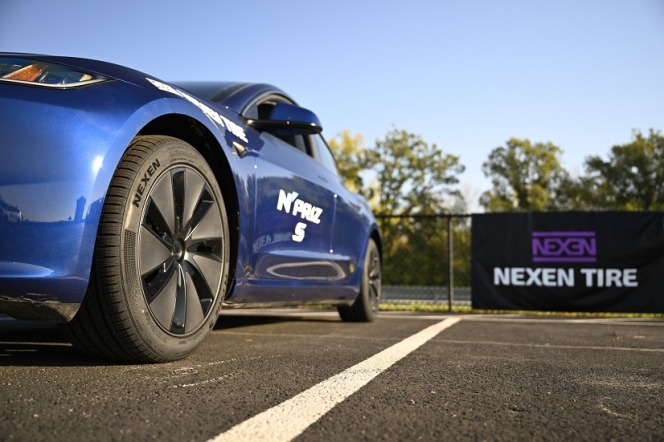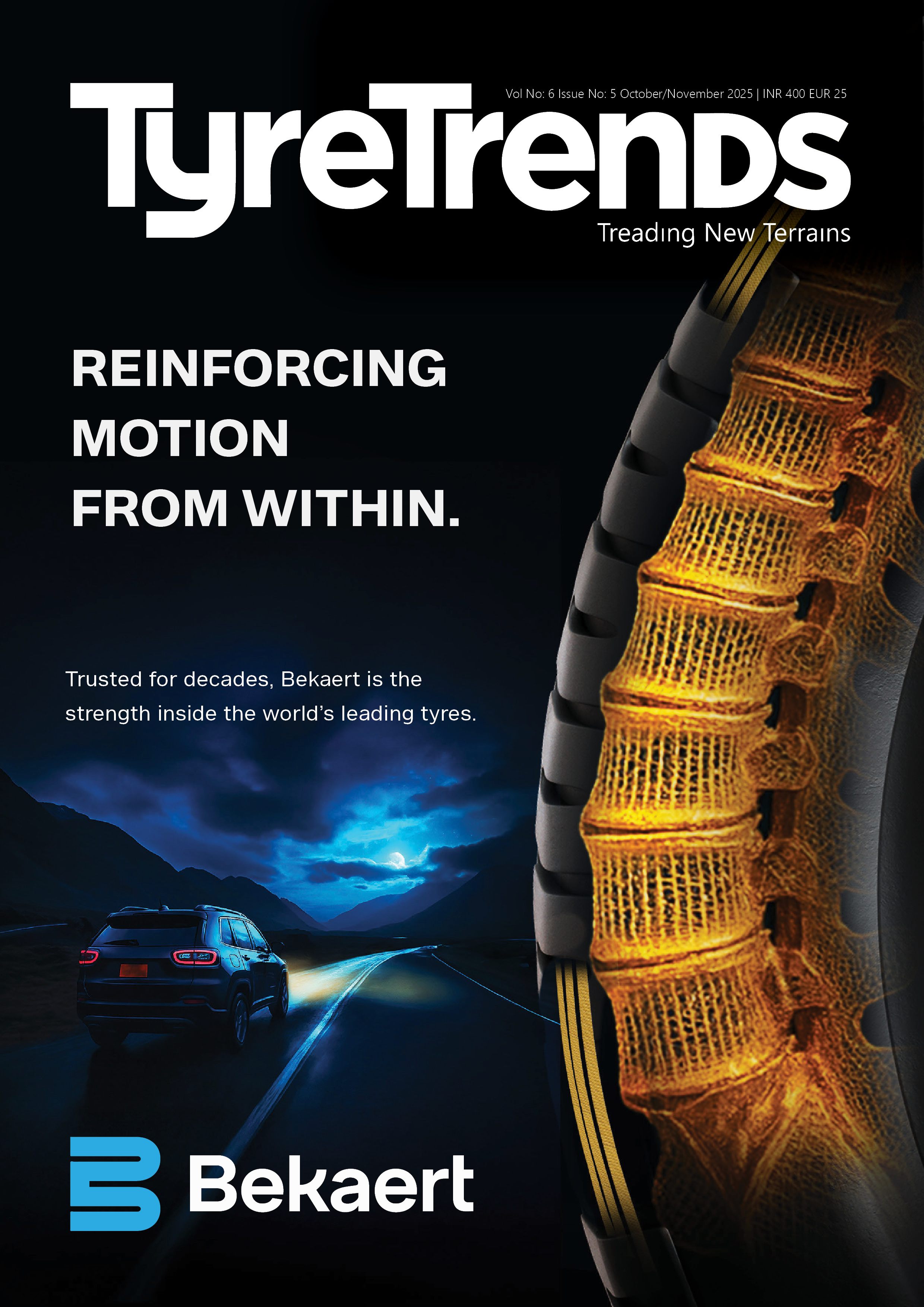TOWARDS A STEADY, STABLE FUTURE
- By Varun Awasthi
- August 21, 2020

Stumbling under the impact of pandemic lockdown, OEM sector is expected to perform under pressure on account of supply and demand disruptions. However, there are positives vibes from the tyre industry, foreseeing steady and stable future. Bing-Lin Wu, Marketing Head, Maxxis Tyres India, globally leading 2-wheeler tyre makers, talked to Tyre Trends on sustainability, future plans, and strong ethos on which the brand stands
The pandemic has created a challenging situation for the OEM’s and the ancillary industries. However, we are hopeful that as the situation gets better, things will move at a steady pace and will open new avenues for the industry. Once out of this uncertainty, our key focus will be to re-energise the production and marketing department, Bing-Lin Wu, Marketing Head, Maxxis Tyres India, told Tyre Trends in a recent interview

How does pandemic affect production and market strategies?
Maxxis India plant has started operations in a graded manner following all government protocols of social distancing, limited workforce and other safety measures for the employees. The development came after a recent announcement from the state government, which has permitted companies to resume manufacturing operations. During this time of COVID-19, all our marketing activities have been shifted towards internal/stakeholder communication to apprise them effectively about respecting the lockdown.
What is the role of automation in the Maxxis' plants in India?
Maxxis Rubber India is the latest tyre manufacturing plant in the entire global Cheng Shin group. All the processes like Rubber Mixing, Semi Products manufacturing, tyre building and Curing, Material handling, Inspection and Testing are being done by Automatic or Semi-Automatic machines. These machines are equipped with devices like actuators, sensors, PLCs and HMI (Human Machine Interface) systems to reduce human intervention and automate the process. Quality parameters like the circumference of bead wire, green tyre weight, dynamic balancing of tyre and also many other parameters, which are very crucial in tyre making are controlled and monitored by automated sensors. This automated sensor system is not just monitoring the parameters, but they also stop the defective product from going into the next process. As the quality control parameters are controlled at each step of the manufacturing process, it minimises the defect rates in the final product.
How do you evaluate the developed and developing market when it comes to technology, product offerings, and marketing strategies?
Over the years, developing countries have evolved in a big way, paving the way for global manufacturers to explore opportunities that exist in developing markets today. I think India is a glaring example of how the gap between developed and developing countries is shrinking rapidly. Today’s customers are exposed to new technologies, the latest products, and features that have made them aspirations and created disruption in the market for consumer’s good.
Recently you got the mandate from Yamaha for selected models like Ray, Fascino, etc. How is this changing metrics to Maxxis tyres?
Maxxis had a great start this year as we entered into a partnership with YAMAHA. As per the agreement, Maxxis will be supplying BSVI compliant scooter range of Yamaha Ray ZR, Fascino and Ray ZR Street Rally 125 FI. Additionally, we announced another significant association with Yamaha by collaborating with YAMAHA for a one-of-its-kind retail partnership. As per the association, co-branded Maxxis Tyres will be made available for sale at YAMAHA dealerships. Both these partnerships along with another recent partnership with SUZUKI Motorcycle for Access 125 will help elevate Maxxis' presence across key markets in India and scale up the growth of our replacement market portfolio.
Which are the OEMs you are working with and how do you see the business growing in the near future?
Globally we are in the top 10 ten tyre manufacturing company, in the Indian market we have partnerships with top 2-wheeler manufacturers like Honda 2-wheelers, Yamaha Motor India, Hero MotoCorp and Suzuki Motorcycle India. In addition to this, we do supply four-wheeler tyres to Mahindra & Mahindra, Tata Motors, Maruti Suzuki and Jeep in India. Our goal in India is to gain up to 15% market share in the two-wheeler market including OE projects. Our long-term plan for operations includes setting up of five manufacturing plants in different parts of the country to be able to cater to all requirements in the region.
Even though the circumstances are not very favourable at the moment for the automotive sector, but the OEM sector is optimistic as India is fourth-largest automobile market in the world and the Indian tyre industry expects a 7-9 percent growth over FY19-23.
What are your activities to enhance the brand image?
Maxxis Tyres represent strong ethos on which the brand stands for such as Safety, Reliability and Complete Peace of Mind. In 2018, we started a very unique initiative ‘Women in Front’, the program aims to empower and encourage Indian women to experience the freedom of riding and challenge gender stereotypes. As a company with strong biking DNA, we believe that superior performance and safety go hand-in-hand. Through this initiative, we want to equip the women with relevant training and safety practices that will help them take the front seat and pave their own journey without any fear or hesitation. Additionally, we leverage the dealer to meet platforms and industry events to enhance visibility for the brand. For instance, last year we participated in Gujarat Mechanic Auto Expo and Surat International Auto Expo in which we received over 2,500 and 1,500 inquiries, respectively. We also launched social media campaign #PaanchSaalBemisaal, during Lok Sabha elections around the idea, ‘Waade Pe Gaadi Nahi Chalti, Warranty Pe Chalti Hai’. The campaign used humor through a crisp story to establish the brand property connect with the election theme at the forefront and Maxxis 5-year No Questions Asked Replacement Warranty.
What are the benefits of becoming a dealer and engaging in Maxxis dealer program, currently how big is the dealer network and how does it help customers?
We are one of the biggest tyre manufacturing brands worldwide and we are fast expanding in India. We are exploring new tie-ups and synergies, launching new tyre models with plans of setting up new plants. A Maxxis dealer enjoys several benefits- Training Benefits –Shop Boy Training, Canopy Campaign, Fitters’ Meet and Other Benefits –Branding Support, Feature for customers to locate our Dealer online through our site with directions, Sale & Service Support etc. We conduct dealer meets on a regular basis pan India to ensure seamless communication with the dealers. Currently, we have around 2,000 dealers onboard from all over the country. Last year we opened an exclusive retail store in Goa. This is Maxxis Tyres First flagship store in India and will provide the highest quality tyres in India with a strong customer-first approach.
What is your take on tyre retreading?
Understanding the anatomy of genuine retreading is crucial. Having a cost-effective tyre programme in place, including retreading casings wherever possible, is important. Globally, some tyre manufacturers cite that by adopting a high-quality retreading process, excellent performance levels that are equivalent to those of new tyres are assured, along with efficiency and cost savings. Like Tyre making, retreading also involves certain steps to ensure quality, However, in India, many manufactures in the unorganized sector are not following proper steps which have a bad influence on the overall retreading industry affecting the genuine ones. In the case of two-wheelers, retreading is not commercially viable at all, so the rates at which the illegal retreaded tyres are available, provides no doubt that the quality is compromised and is not properly retreaded.
Apollo Tyres Expands Industry-Academia Collaboration
- By TT News
- October 31, 2025

Apollo Tyres’ Chennai Plant has formalised a multi-institutional partnership through a Memorandum of Understanding (MoU) with five esteemed engineering colleges from Kerala, Odisha and Tamil Nadu. This strategic alliance is designed to fortify the nexus between industry and academia, with a focused objective of developing a robust, industry-ready talent pool to meet future sector demands. The collaboration represents a significant investment in the human capital pipeline, directly linking academic output with corporate needs.
The collaborating institutions in this forward-looking initiative are SASTRA University, SRM TRP Engineering College, JJ College Of Engineering & Technology, Ma'din Academy and Nilachal Polytechnic. The partnership’s framework encompasses a comprehensive suite of initiatives aimed at mutual development. For students, it provides a structured pathway to employment, including placement assurances during their final year and enhanced campus hiring opportunities. To bridge theoretical knowledge with practical application, the programme will facilitate organised industry visits to Apollo’s manufacturing facility, offering students firsthand exposure to modern production processes. Complementing this, a series of expert-led sessions, technical lectures and seminars will be delivered by in-house professionals from Apollo Tyres, ensuring the curriculum remains aligned with evolving industry practices.
This symbiotic engagement yields significant strategic benefits for all stakeholders. Students gain invaluable industry awareness and confidence, while academic institutions enhance their curriculum's practical relevance. For Apollo Tyres, the initiative enables the early identification and nurturing of prospective talent, effectively streamlining recruitment and fostering a positive perception of manufacturing careers.
Wacker Chemie Cuts Outlook As Weak Demand Hits Q3 Earnings
- By TT News
- October 30, 2025

German chemicals group Wacker Chemie lowered its full-year outlook after third-quarter profit fell by nearly a quarter, hit by weak demand and intense competition from China.
The Munich-based company, which makes silicones and polysilicon for semiconductors and solar panels, reported earnings before interest, tax, depreciation and amortisation (EBITDA) of 112 million euros ($121.6 million) for the July-September period, down 23 percent from 145 million euros a year earlier.
Sales fell 6 percent to 1.34 billion euros from 1.43 billion euros, weighed down by lower prices and unfavourable currency effects.
The results were broadly in line with analyst expectations, which had forecast sales of 1.37 billion euros and EBITDA of 101 million euros, according to Vara Research.
Wacker swung to an operating loss of 20 million euros in the quarter, from a profit of 30 million euros a year ago, whilst net income turned negative to 82 million euros, compared with a profit of 34 million euros.
“The chemical industry is under pressure – worldwide, but in Europe in particular. The economic situation is tense, and market demand is weak. At the same time, the market environment is changing, and competitive pressure is high – especially from China. And this is something that we are experiencing at WACKER as well,” Chief Executive Christian Hartel said.
“Like many other companies, we had to lower our full-year forecast in the middle of this year. Even though we closed Q3 in line with market expectations, sales and earnings were again down year on year in almost all business divisions,” he said.
Wacker launched a comprehensive cost-cutting programme in October aimed at achieving significant savings in production and administration, with implementation planned to begin in the first quarter of 2026.
The company now expects full-year sales at the lower end of its previously forecast range of 5.5 billion to 5.9 billion euros, with EBITDA in the lower half of its 500 million to 700 million euro range. It also anticipates a negative net result for the year, significantly below the previous year.
The company’s silicones division, its most significant business, saw sales decline 7 percent to 673 million euros, whilst EBITDA fell 19 percent to 86 million euros. The polysilicon unit, which serves both solar and semiconductor markets, reported a 40 percent drop in EBITDA to 18 million euros, as low prices and exchange-rate effects offset strong hyperpure polysilicon performance in semiconductors.
Wacker’s workforce declined to 16,616 employees at the end of September from 16,724 three months earlier.
Nokian Tyres To Cut 80 Jobs, Lay Off 650 Workers Temporarily In Restructuring
- By TT News
- October 30, 2025

Finnish tyre manufacturer Nokian Tyres said it would cut 80 permanent positions and temporarily lay off about 650 workers as part of measures to improve financial performance and operational efficiency.
The company has begun personnel negotiations affecting roughly 1,700 permanent white-collar positions across its global operations, including group functions and all business units.
The temporary layoffs will affect blue-collar and white-collar staff at passenger car and heavy tyre production facilities in Nokia, Finland, for up to 90 days per person. These measures could be implemented by the end of 2026.
The permanent job cuts, targeting white-collar roles, may take effect by late 2025, the company said.
Nokian Tyres employed approximately 4,400 people worldwide at the end of September, with 2,045 staff based in Finland.
The negotiations will commence immediately in line with local labour legislation in each country where the company operates.
The announcement comes as tyre manufacturers face pressure from volatile raw material costs and shifting demand patterns in key markets.
Nokian Tyres, known for its winter tyres and premium products, has been restructuring its operations following geopolitical challenges that affected its Russian production and sales.
Nexen Tire Stages Two-Phase Launch For Flagship N’Priz S And N’Fera Sport Tyres
- By TT News
- October 30, 2025

Capitalising on a period of significant growth, Nexen Tire is strategically introducing two new passenger tyres, the N’Priz S and the N’Fera Sport, through a comprehensive two-stage launch. This initiative represents one of the company's most substantial product introductions, designed to engage key audiences from media to consumers through immersive, hands-on experiences.
The launch commenced earlier this fall with an exclusive Ride N’ Drive event at the Illinois Autobahn Country Club. There, participants had the opportunity to personally evaluate the new tyres across a variety of driving conditions, including autocross challenges and highway simulations. This direct testing allowed them to assess critical performance attributes such as handling and comfort while also facilitating valuable interaction with Nexen’s own engineering and product development teams.
The campaign now advances to a broader stage, moving to the 2025 SEMA Show in Las Vegas. Nexen Tire America will host an extensive activation featuring a 240-foot booth where the N’Priz S and N’Fera Sport will be prominently displayed. The exhibit will include original equipment vehicles, motorsports trucks competing on Nexen tires and a dynamic schedule of live discussions with company leadership, technical experts and brand partners on the specially created Nexen Live stage. This platform will also serve to showcase the brand's latest progress in areas like tyre design simulation and electric vehicle development.
These two tyres are engineered to meet the distinct needs of different drivers, thereby broadening Nexen’s market reach. The N’Priz S is a grand-touring all-season tyre that is also EV-compatible, focusing on delivering a quiet, comfortable ride and reliable traction for daily commuting and long-distance travel. It incorporates advanced AI performance prediction and virtual simulation technology to optimise tread design and reduce cabin noise, alongside a specialised rubber compound aimed at enhancing tread longevity and overall efficiency.
In contrast, the N’Fera Sport is an ultra-high-performance summer tyre built for drivers seeking precision steering response and superior control in warm conditions. Its design prioritises direct feedback, confident wet-road braking and stability while still maintaining usability for spirited street driving. The N’Fera Sport is scheduled to arrive at dealers this fall, with the N’Priz S following in early 2026. Together, these launches underscore Nexen’s commitment to technological innovation and creating meaningful connections with the driving public.
Brian YoonSeok Han, CEO, Nexen Tire America, said, “Nexen Tire’s growth in the US is being fuelled by innovation and experience. We wanted people to feel what sets these new tyres apart, including how they handle, how they perform and how they represent our continued commitment to excellence. Ride N’ Drive gave us that direct connection with our partners, and now SEMA allows us to share that story on a global stage.”
Theresa Kapper, Director of Marketing for Nexen Tire America, said, “Launching the N’Priz S and N’Fera Sport through both Ride N' Drive and SEMA us to connect every piece of our story, from innovation and testing to excitement and scale. It’s about showing not only what these products can do, but what Nexen stands for as a brand. This rollout reflects the growth, energy and ambition driving Nexen Tire forward in the US market.”







Comments (0)
ADD COMMENT